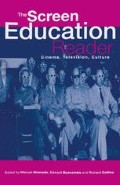Abstract
It seems to me that there are two ways of introducing a discussion of cultural studies and educational practice.1 One can either proceed by review or by argument. The method of review implies some attempt to describe the field of cultural studies or those parts of it most relevant to ‘popular culture’. We might start by considering, for example, the different uses of the terms ‘popular’ and ‘culture’. We might consider some parallel couplets: mass culture, working-class culture, subculture, even dominant culture. We might note the presence of other opposed or complementary terms: older ones like values, myth or consciousness, newer or refurbished ones like ideology, the symbolic, representation, signification or, the favourite of the day, discourse. Reviews like this may produce useful maps, indispensable to explorers — especially over such bumpy ground as this is! By concentrating on the variety of definitions, they perform a useful relativising function. They remind us that educational practices are inextricably connected to language and to the choice of categories. ‘Theory’, in this sense, need not be abstruse, but is, rather, a part of making us critically self-conscious of what is implied by the use of certain words and concepts. The danger is that such cartography foregrounds a tiny bit of social process, especially the activities of specialist intellectuals.
Screen Education, no. 34, Spring 1980.
Preview
Unable to display preview. Download preview PDF.
Notes
For a recent exchange on these questions see Edward Thompson, ‘The Politics of Theory’, in the forthcoming volume of Ruskin History Workshop Papers. For a longer analysis see Richard Johnson, ‘The Three Problematics’, in J. Clarke, C. Critcher and R. Johnson (eds), Working Class Culture, London: Hutchinson, 1979.
For a fuller identification see Working Class Culture, op. cit; for a more extended review see Rosalind Coward and John Ellis, Language and Materialism, London: Routledge & Kegan Paul, 1976,
and Tony Bennett, Formalism and Marxism, London: Methuen, 1979.
For a longer account of the opposition see Richard Johnson, ‘Histories of Culture/Theories of Ideology’, in Michele Barrett et al. (eds) Ideology and Cultural Production, London: Croom Helm, 1979.
For an interesting review of recent work on Gramsci see Bob Jessop, ‘The Gramsci Debate’, in Marxism Today, February 1980.
See, for example, M. Foucault, Discipline and Punish: The Birth of the Prison, London: Allen Lane, 1977, p. 27.
See especially Paul Willis, Learning to Labour: How Working-Class Kids Get Working-Class Jobs, London: Saxon House, 1977,
and Angela McRobbie, ‘Working-class Girls and the Culture of Femininity’, in CCCS Women’s Studies Group Women Take Issue, London: Hutchinson, 1978.
Quintin Hoare and Geoffrey Nowell-Smith (eds), Selection from the Prison Notebooks of Antonio Gramsci, London: Lawrence & Wishart, 1971, p. 323.
Editor information
Copyright information
© 1993 Richard Johnson
About this chapter
Cite this chapter
Johnson, R. (1993). Cultural Studies and Educational Practice. In: Alvarado, M., Buscombe, E., Collins, R. (eds) The Screen Education Reader. Palgrave, London. https://doi.org/10.1007/978-1-349-22426-5_17
Download citation
DOI: https://doi.org/10.1007/978-1-349-22426-5_17
Publisher Name: Palgrave, London
Print ISBN: 978-0-333-54126-5
Online ISBN: 978-1-349-22426-5
eBook Packages: Palgrave Social & Cultural Studies CollectionSocial Sciences (R0)

